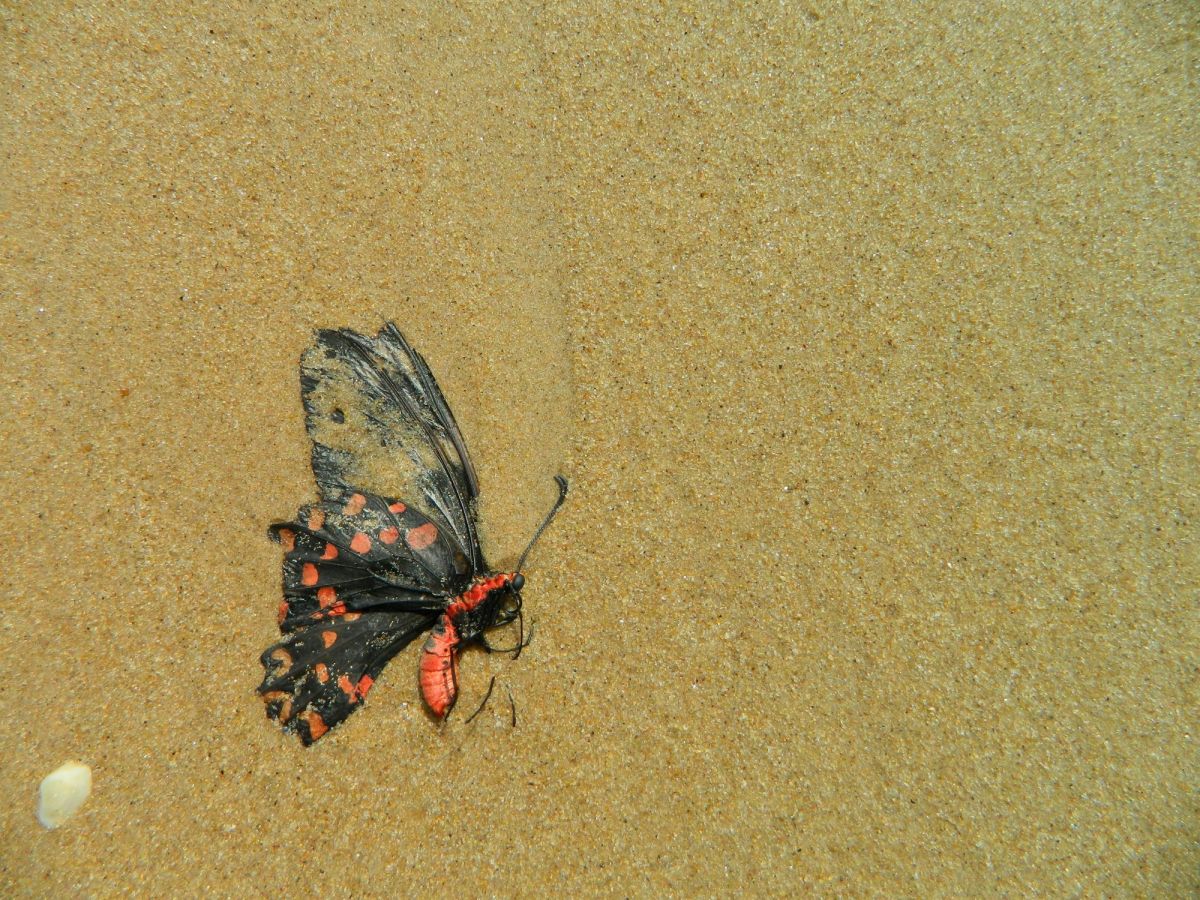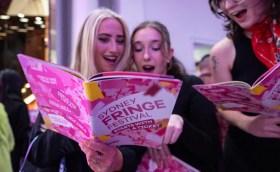The abrupt closure of independent performance venue The Butterfly Club on Saturday 26 July shocked the local arts community.
Jump to:
As per the story broken by ArtsHub on Friday 25 July, the venue’s closure was initially announced via email to artists who had seasons booked at the quirky and colourful venue in the coming weeks.
‘Any costumes, set pieces or other property of your show that has already been bumped into the venue will need to be collected before 5:00pm, Wednesday 30 July. After this time, we will not be able to guarantee access to the venue to collect any items that remain on site,’ the email sent to artists read in part.
Yesterday (Thursday 31 July), after six days without publicly commenting on its closure, The Butterfly Club finally published a heartfelt message about the situation shortly after 6pm.
‘A number of factors have contributed to this unfortunate outcome, and while it is tempting to wallow in rumination, we believe it would be most fitting to instead focus the spotlight on the profound sense of gratitude that we feel for our incredible community … The outpouring of love and support our team has received has been nothing short of extraordinary; a timely reciprocation, while our hearts collectively break,’ the social media post read, in part.
‘As we traverse the many, many (many!) stairs of our home in Carson Place and chisel the blutak off the walls for the final time, we remember a venue that has seen an innumerable flutter of courageous writers, directors, performers, producers, accompanists, technicians and publicists (even journalists LOL) take irreverent risks, undergo various forms of artistic metamorphosis, and mount some truly ambitious debuts; some destined for accolade and acclaim, some fated to fail, but all of them given the support to shoot their shot regardless.
‘We urge you to keep making art. Keep creating spaces for it to exist and thrive. Keep being brave, push boundaries, and continue to support one another … We would also like to thank the many local venues that have stepped into rehome productions that had otherwise been programmed at the club. It is heartening to know that these productions will live on elsewhere,’ the message read.
Indie theatre company scrambles to find a new venue
The Butterfly Club, which first opened in Banks St, South Melbourne in 1999, later relocating to Carson Place in Melbourne’s CBD, played a pivotal role in the development of Melbourne cabaret, comedy and theatre for 25 years.
One production that was due to open at The Butterfly Club this week, Bask Theatre’s Boundless Plains, luckily found a new home relatively quickly. Producer Tully Jones, who is also the play’s co-creator, tells ArtsHub she didn’t believe the email announcing the venue’s closure was real when she first received it.
‘I thought it was a bit of a joke. Then I reread it and reread it and called my business partner Ella [Waterman], and as soon as I read it out to her, we both just kind of started crying – and then the devastation hit,’ Jones says.

After allowing herself the luxury of a ‘one hour freak out,’ and knowing that Boundless Plains – a classic box office split independent production – had been due to bump into The Butterfly Club on Monday 28 July, Jones’ producing instincts kicked in and she sprang into action.
‘I was like, “Okay, it’s Friday afternoon. Venues won’t have their managers in over the weekend. I need to work really quickly if I’m going to get this sorted”. Our cast are all blow-ins from other states, so we have people flying in from basically every state in Australia to see this show. So that was our biggest concern, having a space to show the work that we put in for the last eight weeks. And yeah, I just immediately went to every venue that I could throw a stick at. They all got back to me really quickly, which was so, so great, but it was just the timing. Really I needed something for this weekend [Friday 1 to Sunday 3 August] and next weekend, so that the people flying over would have a show to see,’ she tells ArtsHub.
‘The MC Showroom, Malthouse, and Club Voltaire were all very quick to respond with messages of support and offers to remount the show later in the year. Luckily we had the support of our community behind us and we have been able to relocate four of our original show dates to Essendon Theatre Company, a community theatre group that is dedicated to showcasing local talent.’
Bask Theatre’s Boundless Plains – a slice of Australian Gothic set in a small country town – opens tonight (Friday 1 August) as originally planned, thanks to Jones’ frantic work and the tightly networked independent and community theatre sectors.
Despite the stress and pain of the last week, Jones says the experience has not been without its positives, too.
‘Sometimes the theatre world can feel so hard to break into, but I think this experience – for me especially – has made me realise how generous artists are and venues are as well. They just want to see artists put on their work, which has been so fulfilling,’ she explains.
Indie venues to the rescue
Melbourne’s many small independent venues sprang into action with the news of The Butterfly Club’s sudden demise.
Mikki Michelle, the Marketing and Booking Manager of North Melbourne’s Club Voltaire, tells ArtsHub: ‘We’ve had several inquiries over the last week from people who’ve had their shows cancelled due to the closure of The Butterfly Club. We know how dubious the arts can be, especially now. So it was imperative for us to let performers know they are welcome in our space. We’ve confirmed at least two Butterfly Club shows now taking place at Club Voltaire, and are always open to any other shows in search of a new home.’
Carlton’s multi-arts venue The Motley Bauhaus, is similarly in discussion with seven Butterfly Club refugees currently.
Jason Cavanagh, The Motley Bauhaus’ owner, says: ‘The Butterfly Club existed for 25 years – I’ve had three venues in that time and the fact it has been allowed to close is just a little terrifying, actually. Same as when La Mama announced their “time out” and when the Gaso [Collingwood’s live music venue The Gasometer Hotel] closed earlier in the year. Eventually it starts to feel like that scene in Indiana Jones where he’s walking on that stone path and if he steps on the wrong one it just crumbles away … And there’s no mystery to it … the fact is if live venues had the kind of support they actually needed, this wouldn’t keep happening.
‘It’s so crazy to me that governments are allowing it. Live venues bring so much lifeblood to the local area, people come for an art opening or to watch a live show and while they’re there they go grab a drink, do some window shopping, eat out, get a coffee. These venues feed and support the local economy like no other business can … To me it’s obvious we need more support and investment in the arts, that’s how to turn this around; supporting and encouraging local venues to open and then doing what we can to grow them and of course keep them [from] closing,’ he continues.
‘I mean, of course I have a bit of a vested interest here, but I would never have opened The Motley if I didn’t believe so strongly in what we do. It certainly wasn’t easy to open and, yes the challenges continue – but then if it was easy I guess everyone would do it. Which would be great, actually,’ Cavanagh concludes.
Read: We’re All Gonna Die! – Maddie Nixon’s climate show ‘smashes Brisbane’s buildings’
Miao, the Owner/Producer of Prahran’s The MC Showroom, says she was ‘deeply saddened to hear of The Butterfly Club’s sudden closure – it’s a huge loss to Melbourne’s independent arts scene. Like many in the community, we hold immense respect for the space and the platform it provided emerging and experimental works over the years.
‘In the days following the announcement, we were approached by four to five independent productions looking for alternative venues at short notice. Two of these were unable to proceed due to prior bookings at our venue, but we’re still in active conversations with others to find ways to accommodate them, either now or in the near future,’ she says.
A threat to Melbourne’s arts ecology
Unlike The Butterfly Club, which operated on a box office split model, The MC Showroom is a venue-for-hire which naturally presents a different set of challenges and resources for artists.
‘That said, we’ve always aimed to meet producers where they are – whether that means negotiating flexible terms, adjusting schedules, or simply offering moral and peripheral support in moments of crisis. This situation is no exception,’ Miao tells ArtsHub.
‘The closure of The Butterfly Club doesn’t just reduce the number of stages available in Melbourne – it removes an entire ecosystem built around supporting new, bold, and independent work. We expect increased demand for the few remaining independent venues, and while that will put pressure on our calendar and resources, it also reinforces how crucial it is to keep these spaces thriving.
‘We’ll continue doing what we can to support artists, both displaced and emerging. It’s never just about stage time – it’s about nurturing a sustainable creative culture where risk-taking is possible and voices of all kinds can be heard,’ she says.
Theatre Works offers support – and a warning
Dianna Toulson, Executive Director and Creative Producer of Melbourne venue Theatre Works, tells ArtsHub: ‘Theatre Works has not been able to rehouse any shows displaced by the Butterfly Club closure. We did put out a few social media posts offering support and solidarity, but our year-round, back-to-back programming model – across both our venues – simply doesn’t leave the space or flexibility required to take on additional work at short notice. That said, we are always open to being contacted by artists and producers. While opportunities are limited, we’re happy to explore any possibilities where we can.
‘We are devastated by the closure [of The Butterfly Club], and our hearts are with the artists impacted. Sadly, this speaks to a wider structural issue in our sector: even as artists continue to create in abundance, the number of sustainable presentation opportunities remains limited,’ she says.
The long term impact of The Butterfly Club’s closure on Melbourne’s cabaret and independent theatre sectors will be significant, Toulson continues.
‘The Butterfly Club has played a vital role in Melbourne’s theatre ecosystem as an incubator space. It offered artists a way to test work, build audiences, and learn how to produce and budget at a manageable scale and risk. The venue’s small size and central location made it ideal for developing early-career artists – but it also limited box office returns, creating ongoing financial challenges for both artists and the venue itself.
‘Its closure highlights broader structural issues affecting the entire sector. The rising cost of doing business – including rent, utilities, staff wages, insurance, and even incremental increases in superannuation – has created unsustainable conditions, especially for venues operating without government support. These costs can’t be passed onto artists, nor can ticket prices rise indefinitely.’
Simultaneously, Toulson notes, Melbourne has seen a proliferation of venues entering the independent performance space over the past five years. ‘This expansion of venues hasn’t been matched by a coordinated effort in audience development. While there is still an abundance of artists making work – which is worth celebrating – the audience base hasn’t grown at the same rate. Without investment in audience-building strategies, the financial return for artists and venues is being stretched across more productions, resulting in thinner revenue and increased pressure across the board,’ she continues.
‘The Butterfly Club’s lack of public funding was undoubtedly a key factor in its closure. In the current landscape, even funded organisations are under strain. With no CPI increase from Creative Victoria, what looks like flat funding is in reality a slow erosion of capacity. The push toward diversifying income through philanthropy, sponsorships, and donations is important, but it has become more difficult than ever post-COVID. Without deeper investment in both artist development and audience cultivation, we risk weakening the very ecosystem we’re trying to sustain,’ Toulson concludes.






